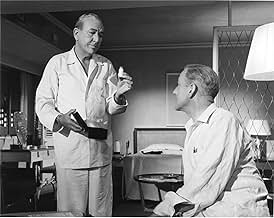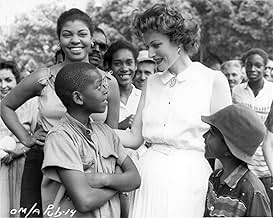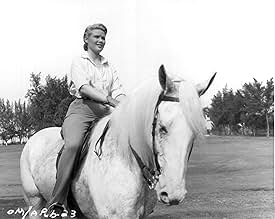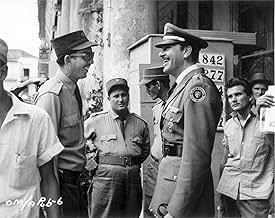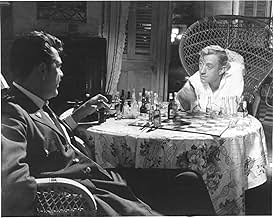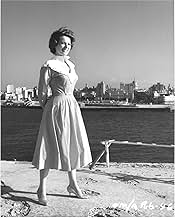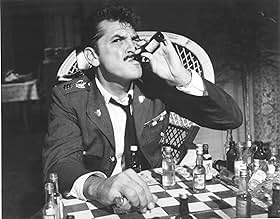Füge eine Handlung in deiner Sprache hinzuExpatriate vacuum cleaner salesman Jim Wormold agrees to work as an agent, and to recruit new agents, for the British Secret Service in Cuba, but he soon realizes that his deceptive ways are... Alles lesenExpatriate vacuum cleaner salesman Jim Wormold agrees to work as an agent, and to recruit new agents, for the British Secret Service in Cuba, but he soon realizes that his deceptive ways are going to get him in trouble.Expatriate vacuum cleaner salesman Jim Wormold agrees to work as an agent, and to recruit new agents, for the British Secret Service in Cuba, but he soon realizes that his deceptive ways are going to get him in trouble.
- Auszeichnungen
- 2 Nominierungen insgesamt
- Cifuentes
- (as Gregoire Aslan)
- Lopez
- (as Jose Prieto)
Empfohlene Bewertungen
Guinness frequently played characters leading double lives. Here we see his character Wormold tripped up by one that may cost him his life. Wormold is a vacuum cleaner salesman in Havana who is approached by a fellow named Hawthorne (Noel Coward), alias Agent 59200, who wants Wormold to serve the British Secret Service "for $150 a month and expenses" as his subagent, 59200/5, collecting secret information regarding pre-Castro Cuba.
Encouragement for this comes not only indirectly from his love for his spendthrift daughter Milly (Jo Morrow) but more directly from his best friend, a castoff German doctor named Hasselbacker (Burl Ives), whose advice forms the heart of the message from screenwriter Graham Greene, adapting his own novel:
"That sort of information is always easy to give. If it is secret enough, you alone know it. All you need is a little imagination...As long as you invent, you do no harm. And they don't deserve the truth."
The joke, which is also the story's tragedy, is Wormold invents too well, convincing not only his London paymasters but the opposition of his fiction's veracity. Director Carol Reed famously made a spy film, "The Third Man," which blended tragedy and comedy in equal measure. This time, the comedy is more front-and-center, but efforts at creating a light tone conflict with the more serious message and various characters' fates. "Our Man In Havana" struggles at times with what kind of film it wants to be.
Perhaps Guinness's own difficulty with his part contributes to this confusion. He reportedly found Reed's instruction ("Don't act!") unhelpful. Ives is especially heavy for the film's most delicate part, making it oppressively sad; I wish that Reed's collaborator Orson Welles could have taken this part and invested it with some of his trademark cunning and craft.
Much of "Our Man In Havana" does work, and well. Oswald Morris's cinematography employs actual Havana locations to great effect, using unusually angled shots of the crumbling, sun-drenched city. You feel the tension of Wormold's world in every scene. Ernie Kovacs, a hero of early TV comedy, gets a lot out of a thanklessly straight part, the menacing but sensitive Segura, who lusts for Milly and explains his position with real sensitivity even though he never loses the cruelty of the character.
"Do you play checkers, Mr. Wormold?" he asks.
"Not very well," answers Wormold.
"In checkers, one must move more carefully than you have tonight."
Wormold isn't kidding; he only knows enough to lose. In a world this topsy-turvy, it proves the right approach.
Coward does much to serve the comedy, which would be almost entirely absent without him. His recruitment of Wormold, which is played like a seedy homosexual liaison in bars and men's rooms, is a riot when one knows not only Coward's own legendary proclivities but his friendship with that master of spy fiction, Ian Fleming. Some of the film is even set in Fleming's own Jamaican stomping grounds; one can imagine the creator of James Bond must have enjoyed this send-up of his work before it was a gleam in Albert Broccoli's eye.
"Our Man In Havana" plays with your mind and conscience for an hour and a half. It capably establishes a dark mood with cheerful undertones though it would have worked better vice versa, which was my takeaway from reading the novel. Anyway, it's intelligent, entertaining, and worth a look.
It deals honestly with what intelligence gathering is. A mundane craft open to manipulation not only by governments but also by lowly operatives. Sir Alec Guinness, as he later became, portrays the ordinariness of the seedy characters who carry on this trade. Ernie Kovacs gives a splendid presentation of the laid back but sinister not so secret policeman while Burl Ives is as powerful as ever.
The pre-Castro Cuban setting is well portrayed and one can almost feel the tropical heat as the cast of misfit characters go about there subterfuge business.
The casting is very good. Noel Coward, Gregoire Aslan, Ferdy Mayne and especially Burl Ives as Hasselbacher, the most reluctant of spies are all impressive. Maureen O'Hara is a Rolls Royce when a Morris would have done for this story, but she plays well. I liked Ernie Kovacs as Segura, the brutal police chief; he had a nice vulgarity blended with sensitivity that worked for me.
Now my pleasure would be complete if this picture were available on DVD, and if IMDb would give us the memorable quotes this film abounds in. Like Segura: "one never tortures except by a kind of mutual agreement", or Beatrice's description of her estranged husband: "He was very beautiful; he had a face like a young fledgling looking out of the nest in one of those nature films..."
The casting of Burl Ives and Ernie Kovacs (as German doctor and Cuban police chief respectively) are inspired genius. The glaring exception is Jo Morrow as Wormold's daughter Millie who has been turned into an `American' for the movie and just comes off as annoying, thus undermining Wormolds motivation for his actions. Thus lies the films fundamental flaw. As a book, `Our Man in Havana' is believable. The movie adds an undercurrent of absurdity (aided by Noel Cowards foppish asides and Ralph Richardson's incompetent blundering), without drifting into full comedic genre, which works well but for a few moments of slapstick and the throwaway ending. But there is more than enough here to appreciate. Carol Reed recalls his Third Man/Orson Welles street shadows during the final chase sequence, the music beautifully evokes a vintage Cuba and the cinematic setting oozes the paranoia and drama of the script. As an adaptation of the novel it remains satisfying and is perhaps one of the better adaptations of a Greene novel. All told this movie stands repeated viewing and I urge anyone to track it down.
Wusstest du schon
- WissenswertesFidel Castro's government gave permission for this movie, which presents the fallen regime of Fulgencio Batista in an unflattering light, and also condemns American and British meddling, to shoot on-location in Havana, only a few months after the revolution. It was completed during the brief period in 1959 before Cuba had aligned itself with the Soviet Union.
- PatzerAt the end of the film,the aerial footage of the Tower of London has been flipped, resulting in Tower Bridge being on the West of the Tower of London and all traffic driving on the right.
- Zitate
Capt. Segura: Some people expect to be tortured, others are outraged by it.
- VerbindungenFeatured in The South Bank Show: Sir Alec Guinness (1985)
- SoundtracksLA BELLA CUBANA
(uncredited)
(traditional Cuban melody)
Composed by José Silvestre White Lafitte (1853)
used as love theme in the opening credits
Top-Auswahl
- How long is Our Man in Havana?Powered by Alexa
Details
- Erscheinungsdatum
- Herkunftsland
- Offizielle Standorte
- Sprachen
- Auch bekannt als
- Nuestro hombre en La Habana
- Drehorte
- London, England, Vereinigtes Königreich(Paraliament Square)
- Produktionsfirma
- Weitere beteiligte Unternehmen bei IMDbPro anzeigen
Box Office
- Weltweiter Bruttoertrag
- 114 $
- Laufzeit
- 1 Std. 43 Min.(103 min)
- Farbe
- Seitenverhältnis
- 2.35 : 1


